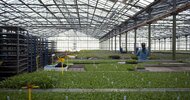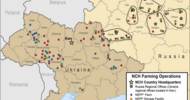By Zaidi Isham Ismail
The expansion is part of a long-term strategy to double planted areas to one million hectares and be nearer to the growing markets of Europe and the US
Sime Darby Bhd, which owns 220,000ha of oil palm estates in Liberia, plans to strengthen its presence on the African continent and is eyeing more land in Cameroon, Congo and South Africa.
Sime Darby Plantation Sdn Bhd managing director Datuk Azhar Abdul Hamid said the conglomerate's plantation arm had received many invitations to Africa.
"But nothing has been formalised and we are still at the early stage. In Liberia, we already have a team on the ground," Azhar told Business Times in an interview.
Sime Darby is one of Malaysia's top five plantation firms, with a total of 530,000ha in Malaysia and Indonesia contributing up to 70 per cent of its annual revenue.
The group also develops properties, sells cars and heavy equipment, and does engineering work for the oil and gas industry, such as fabricating oil rigs.
Azhar said the expansion is part of a long-term strategy to double planted areas to one million hectares and be nearer to the growing markets of Europe and the US.
The group is on track for this. On top of the 530,000ha it already owns, it is looking at more than 300,000ha in Sarawak, while in Indonesia it has another 40,000ha to develop.
"Later on, when the opportunity arises, we may open estates in Brazil or in any South American country near the equator where oil palm grows well."
Azhar said concerns of civil war in Liberia had eased with the presence of the United Nations peacekeeping forces there until 2011.
"Besides, China and the United States are investing in Liberia in a big way to set up resorts and build infrastructure. We cannot wait until everything is perfect and then decide to invest. By then it will be too late."
Sime Darby plans to develop its business in Liberia gradually.
"Liberia, and Africa as a whole, is a good place to grow oil palm. Liberia, for example, can produce up to four million tonnes of crude palm oil, which is enough to feed its own people as well as serve the uropean Union market of six million tonnes.
Apart from palm oil's traditional growth areas in Europe and Asia, demand is also rising in the US where states, such as California, are seeing an increasing Asian population, resulting in changing lifestyles and dietary preferences.
Sime Darby is also open to joint ventures with small plantation firms that are looking to reap the benefits of economies of scale.
"We have received a lot of proposals and are filtering them out. The approach and venture must be beneficial to our growth as a global commodity player," said Azhar.












